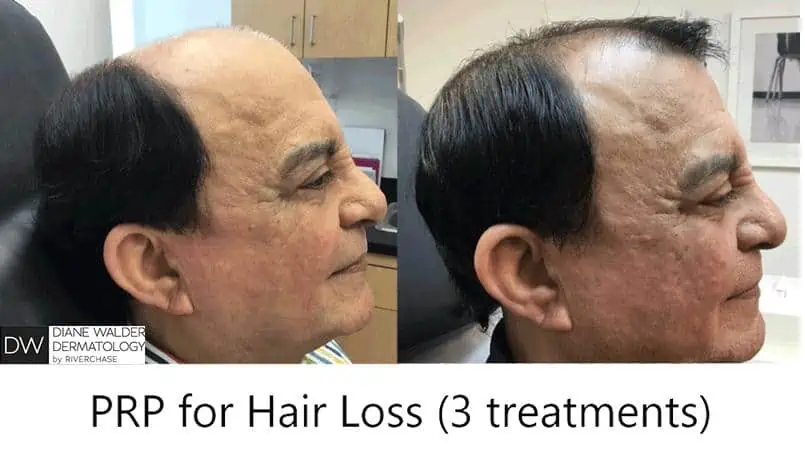Hair loss solutions include:
- Excimer laser treatments
- Topical minoxidil (Rogaine)
- Topical steroids
- Cortisone injections
- Topical immunotherapy
- Vitamin supplements
- Platelet Rich Plasma Injections
*Each patient is unique and individual results may vary.
Are you losing your hair? Millions of people experience hair loss of hair thinning at some in their lives. If hair loss is a beauty concern of yours, consider visiting us to see how we can assist you.
Hair loss, or alopecia, is the sudden or gradual but excessive loss of hair in both men and women. It commonly refers to hair thinning of the scalp, although alopecia can occur elsewhere on the body. The condition is said to occur when hair follicles fail to produce new hair growth, and it can be permanent or temporary. The most common form of hair loss in men is androgen alopecia in which male hormones and genetic factors may combine to produce hair thinning. Alopecia areata refers to baldness in patches. Fortunately, with alopecia areata, in many cases the hair grows back. According to the American Academy of Dermatology, about 80 million people in the U.S. have hereditary hair loss. Women tend to be less comfortable with thinning hair because of social judgment. Men, however, may learn to accept the condition or pursue a variety of treatment options such as topical Rogaine or surgical hair transplants.
Hair Loss FAQs
What does hair loss look like?
George Costanza on Seinfeld bests exemplifies the classic “horseshoe” male pattern baldness where the hairline has greatly receded and has nearly merged with a balding crown, or vertex. Many men may experience a partial or complete thinning of the hair on the crown of the scalp. It is most noticeable as a visible patch of skin in the middle of otherwise still abundant hair growth on the front, back and sides of the head. In female pattern baldness there tends to be a general thinning of hair rather than a discernible pattern as found in men. Moreover, female pattern baldness is not as prevalent as it is in men.
[testimonial post_list=”6039″ display_type=”carousel” include_rating=”true”]
What causes hair loss?
While the jury is still out, doctors believe genetics on the mother’s side may play the biggest role in hair loss in later generations, although genes from both sides of the family may be complicit. Stress, sudden weight loss, diabetes, or thyroid disease also can cause hair thinning. Women who are pregnant may experience. Certain medications and immune system disorders may also cause thinning hair. If you believe that you are suffering from hair loss, schedule an appointment with Dr. Walder to find out what treatment option is best for you.





